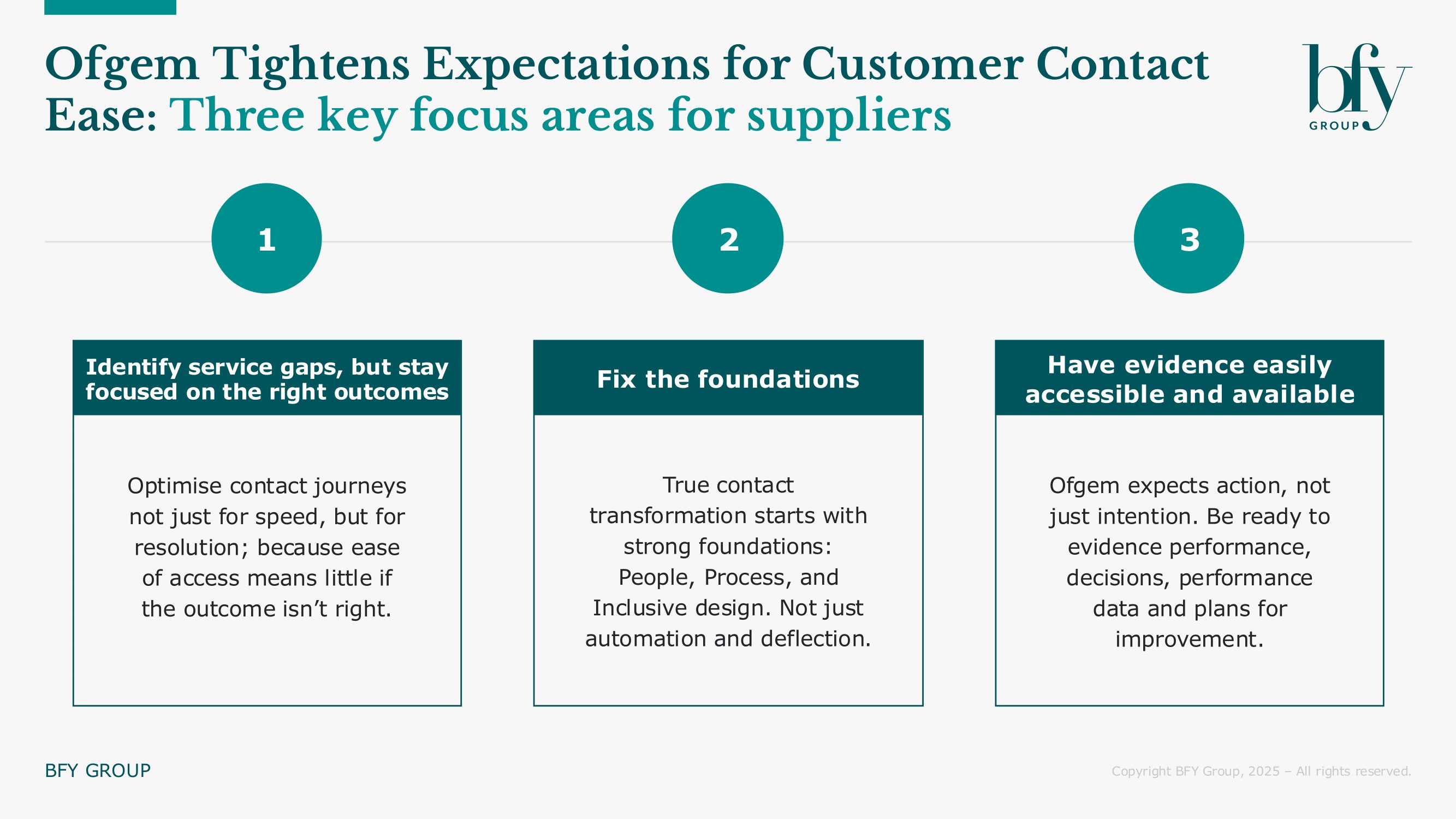From 1st August, Ofgem’s revised guidance will set tighter expectations for how easily customers can contact their energy supplier.
This brings renewed focus to the previous guidance published in October 2023 and comes amid growing concerns about the accessibility of some suppliers, together with increases in complaints from customers unable to reach their provider.
The message is clear, and nothing is inherently ‘new’ - suppliers must make it easy for customers to contact them. Poor access is no longer just a customer service issue, but a matter of regulatory compliance.
What’s in the guidance?
The guidance sets out updated expectations across several key areas:
- Phone contact: Suppliers should answer calls within a reasonable timeframe and ensure call queues are not excessive. Opening hours should also reflect customer needs. Ofgem doesn’t set exact times but expects suppliers to actively monitor and manage this, with the need for suppliers to explain how they have achieved this.
- Email and written correspondence: Customers should receive a timely and meaningful response. Delays of weeks or generic replies are not acceptable.
- Digital channels: Live chat, chatbots and other online tools must work effectively. If a chatbot is used, customers must be able to speak to a human where needed.
- Greater support for customers having difficulty paying: There should be no barriers to domestic customers who are struggling with bills to contact their supplier, with no costs and without incurring any further financial detriment.
- 24/7 availability for meter faults: Suppliers must have a service available to receive enquiries for any domestic interruptions of supply caused by a meter fault.
- Vulnerability assessment and prioritisation: The potential to triage customer characteristics to then prioritise enquiries accordingly is an example given.
- Accessibility: Suppliers must consider the needs of all customers, including those with language barriers, hearing or visual impairments, or low digital literacy.
- Visibility of contact options: Contact information should be easy to find on websites, bills and other customer-facing documents.
- Frontline capability: Customer service agents must be trained to recognise vulnerability and empowered to act appropriately.
This guidance supports the existing licence conditions, especially those within the Standards of Conduct. While not introducing new obligations, Ofgem has confirmed it will use this guidance when assessing compliance and deciding whether to take enforcement action.
Why this matters
Ofgem is responding to sustained evidence that some suppliers are falling short in basic service areas. Citizens Advice recently reported that one in five customers were unable to contact their supplier at all on their first attempt. Inadequate access has also been a recurring theme in Ofgem’s compliance audits.
Poor customer contact has moved beyond a reputational risk and is now a compliance issue that may trigger enforcement.
The challenge for suppliers
The scale of change required will vary across the market. Some suppliers are already making significant investments in digital and contact infrastructure. Others are still carrying operational settling following op model changes or in the middle of system changes that have still to drive improvements.
Either way, there are key things suppliers should be focusing on now:
1) Understand where your service gaps are, but balance against delivering the correct outcomes
Audit or even undertake a Gemba ‘go see’ walk/observations on your contact channels, response times, handoff points and failure rates. If customers are having to try multiple times or give up entirely, you're likely falling short of expectations.
However, whilst it’s clear customers want to contact their supplier easily, they also want to feel heard, supported, and resolved. If we focus only on speed and channel access, we risk creating ‘easy’ contact that’s ultimately ineffective. The right outcome, not just the fast one, should be the ultimate goal.
2) Fix the foundations
Contact performance can’t be solved with automation alone. You need well-trained agents, clear accountability, and robust processes behind the scenes. If your service model isn’t working for vulnerable customers, it’s not working at all. Suppliers are often encouraged to digitise and deflect contact to reduce pressure. But the reality is that the customers who most need help are often the least able to self-serve. True digital transformation must go hand-in-hand with inclusive design, or we risk widening, not closing, the gap.
3) Be ready to evidence what you're doing
Ofgem will want to see how you’ve responded to this guidance – not just what you’re saying but what you’re doing. That includes how performance is tracked, what actions have been taken, and what improvements are planned.

The balancing act
It’s important to recognise that many suppliers have already taken big steps; extended hours, live chat, translation services, better agent training; all often without fanfare. These are not ‘easy wins’ but hard-fought changes made under real financial and operational pressure.
Ofgem’s push to make suppliers easier to contact is well-intentioned, and essential for customers who need help most. But ambition alone isn’t enough.
Suppliers are under increasing pressure to deliver more - better service, smarter systems, stronger vulnerability support - often without additional capacity or support. The result is a growing tension between regulatory expectation and operational reality.
To move forward, we need more than higher standards. We need the right conditions to meet them - investment in tools, leadership space to prioritise, and recognition of the strain on frontline teams.
Being ‘easy to contact’ matters but it must lead to the right outcomes. That’s where ambition becomes meaningful.
Where BFY can help
At BFY Group, we work with suppliers to address challenges like these, delivering more for customers while operating with less time, less budget, and increasing regulatory scrutiny.
Whether it's optimising contact centre operations, embedding vulnerability strategies, or using data to target support where it matters most, we bring hands-on experience and a deep understanding of what works on the ground. Our focus is on helping suppliers make real, measurable improvements without adding complexity or cost.
To discuss how we can support your next steps, contact Jonathan Paton.
Jonathan Paton
Senior Manager
Jon specialises in Customer Operations leadership, customer contact, and operational service delivery transformation/improvement.
View Profile

